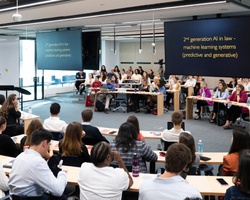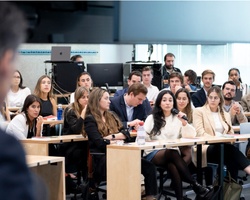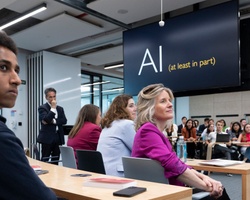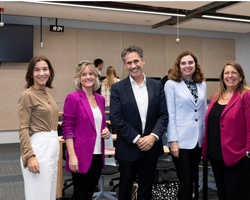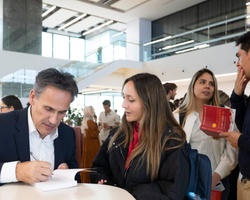- Home
- We Are Law School
- News
- Ie Law School Presents Its 'ai And The Law Initiative' At An Event With Prof. Richard Susskind
IE Law School presents its 'AI and the Law Initiative' at an event with Prof. Richard Susskind
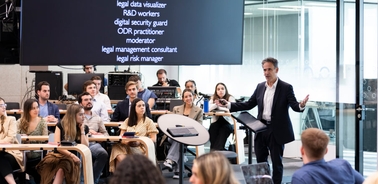
The renowned expert on the future of legal services visited IE Law School for an exclusive event with students.
On September 23rd, Professor Richard Susskind, a globally renowned expert on the future of legal services and President of the Society for Computers and Law, visited the IE Tower for an exclusive event with students that delved into the evolving relationship between technology and legal practice. Susskind, known for his visionary insights on legal innovation, shared thought-provoking perspectives on how technology is transforming the legal profession.
“The AI revolution isn't just knocking at our door - it's bursting through,” highlighted Soledad Atienza, Dean of IE Law School, during the event's presentation. She added that this disruption is not a threat but an unprecedented opportunity, which IE Law School has decided to seize by creating the ‘AI and the Law Initiative’.
The launch of the ‘AI and the Law Initiative’ signals IE Law School’s forward-thinking approach to adapting to the rapid transformations brought about by AI in the legal profession. The initiative addresses these challenges through education, research, and engagement with the legal community. By integrating AI content into all stages of the curriculum, advancing legal research focused on AI, and fostering dialogue with policymakers, professionals across the legal industry, and the public at large, the school equips its community to lead in an AI-driven world.
Atienza emphasized that the initiative aims to equip students not just to use AI, but to lead its ethical and legal development. "Our students must be more than AI-literate; they must be AI-fluent," she stated, stressing the need to be at the heart of this transformation.
The Challenge and Opportunity of AI in Law
During the event, Susskind challenged attendees to rethink the fundamental value that lawyers bring to society. He posed a key question: "What social function do we serve as lawyers?" In a world where only 46% of the global population has access to legal representation or courts, he emphasized that legal knowledge must become more accessible and widespread.
The author of Tomorrow’s Lawyers believes that innovation in law increasingly revolves around the use of technology, from automation to AI. While the most powerful technologies in law have yet to be invented, Susskind believes we are at an inflection point in history, with no clear "finishing line" in sight.
Susskind also outlined potential new roles in the legal sector, from legal data scientists to legal knowledge engineers and legal project managers. He posed a crucial dilemma for lawyers: Will they compete with these emerging technologies, or will they build them?
